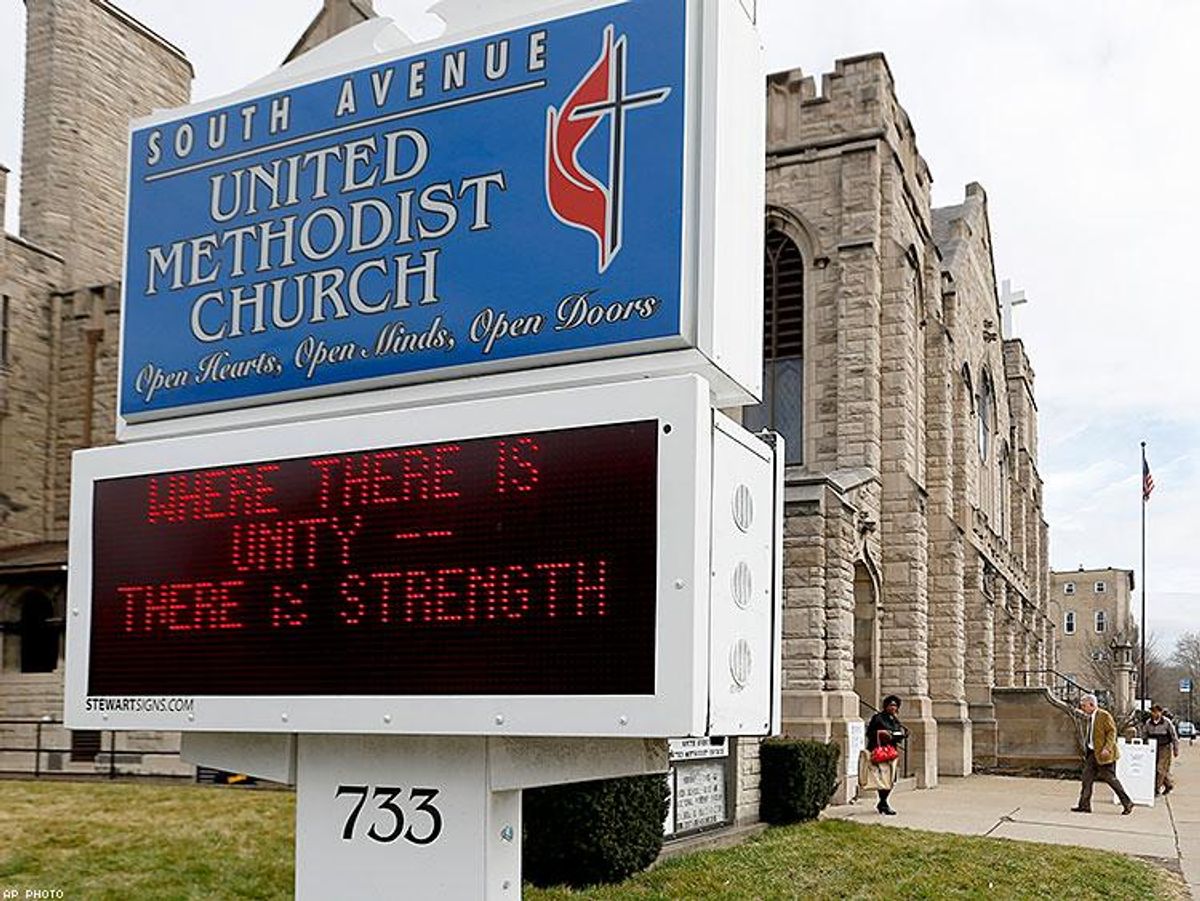In just a few weeks, the United Methodist Church will gather in Portland, Ore., for its general conference to determine church policy and practice for the next four years. "Who cares?" you might be asking yourself. Whether you're religious, spiritual, agnostic, or atheist, here's why you should.
Sadly, the Christian church has played a major role in the oppression of LGBT persons around the world. With nearly 8 million members in the U.S. alone, the UMC is the third-largest Christian denomination in the states, and the last remaining mainline church that prevents LGBT persons from entering ordained ministry and punishes clergy who perform same-sex marriages.
Moreover, United Methodist Church policy formally states that "homosexuality is incompatible with Christian teaching." Because of its sheer size and identity within American and global Christianity, the question of whether or not the UMC opens its doors to same-sex couples and LGBT clergy is critical to the advancement of the civil rights of lesbian, gay, bisexual, and trans people today.
If the UMC votes to end its anti-LGBT, anti-Christian policies this May, it will represent a significant and, one could argue, historic step toward dismantling some of the long-standing prejudices in the Christian church. A significant policy-level change would impact thousands of clergy, millions of members, and countless newcomers to the faith who seek to know and experience God's love and acceptance.
Perhaps most poignantly, such a change would create loving and open communities of faith where children, teens, and young adults could come out without fear of rejection and abandonment, all cloaked in Jesus's name. Becoming a welcoming, affirming faith would send a message to families of all kinds, to the larger communities where our churches are mainstays and influence the broader public discourse; where Christianity still exerts significant influence and power over people's lives. And beyond the positive water cooler and kitchen table conversations, a reversal of the UMC's discriminatory policy would begin to dismantle the widely held view that institutional religion is the biggest obstacle to our equality.
A bold move by the UMC to welcome and celebrate all people would significantly weaken the shrill voices that seek a license to discriminate against LGBT persons in the name of Jesus Christ. What's more, a welcoming and inclusive UMC could take up the cause of LGBT people by standing up and speaking out in places like Charlotte, North Carolina and Houston, where efforts to implement basic nondiscrimination protections for LGBT persons were defeated by brutal, misleading, anti-trans messaging promoted by people claiming the name Christian. Removing harmful policy would free United Methodist congregations and their pastors to stand with us as people of faith -- free from the fear of punishment by the institutional church.
We know that this is not just where the country is moving, it is where Christians are moving. The Pew Research Center found that 62 percent of white mainline Protestants now believe LGBT people should be accepted, even if their churches oppose that move. More to the point, given our upcoming conference, Pew found that 61 percent of Methodists believe it's time to welcome and celebrate our LGBT congregants and clergy.
As a gay man, former United Methodist pastor, and executive director of Reconciling Ministries Network, I have heard from so many LGBT persons who echo Gandhi's sentiment when he said, "I like your Christ, I do not like your Christians. Your Christians are so unlike your Christ."
To help the UMC look less Christian and more like Christ, Reconciling Ministries Network launched a campaign to tell The UMC that #ItsTime to welcome and celebrate LGBT members because we can hear, just as you may hear, those old words reverberating, full of goodness: "Jesus loves me, this I know..."
MATT BERRYMAN is the executive director of the Reconciling Ministries Network.


















































































Viral post saying Republicans 'have two daddies now' has MAGA hot and bothered